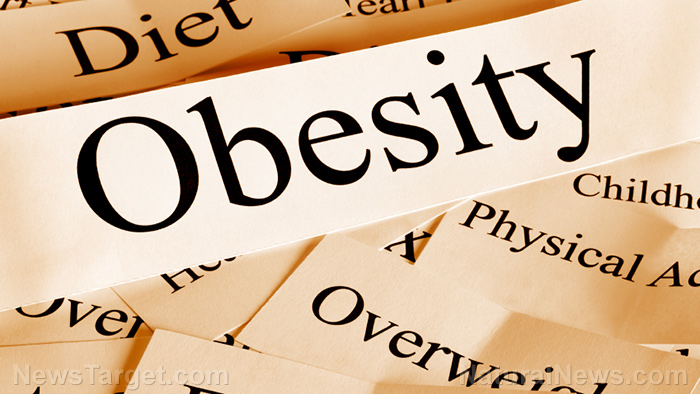US facing obesity problem as poor parents feed their children cheap, unhealthy foods
11/10/2021 / By Zoey Sky

Obesity is an ongoing problem in Western countries, especially in the United States. In most cases, parents of children in poor families try to save money by buying cheap but unhealthy foods to make sure they don’t go hungry.
However, eating processed foods often results to obesity because these food have little or no nutritional value and lots of sugar and carbs.
Big companies are also to blame because they save money on raw materials by using “techniques based on the biology of pleasure and addiction,” which then cause health issues like obesity among consumers.
Consequences of obesity
The World Health Organization (WHO) defines overweight and obesity as “excess fat accumulation relative to body mass index (BMI).” Being obese increases your risk of developing many health problems like heart disease, high blood pressure, sleep apnea, kidney disease, Type 2 diabetes and stroke.
When you are obese, excess body fat puts strain on your bones and organs. Obesity also causes complex changes in hormones and metabolism and increases inflammation in the body.
Conditions like Cushing’s disease (excess cortisol) and polycystic ovary syndrome (PCOS) may cause obesity. If you don’t have these conditions, obesity may be caused by overeating, poor nutrition and lack of exercise.
To lose excess weight, one must improve his eating habits, exercise regularly and make positive lifestyle changes. Data also suggests that obese people are less happy and live shorter lives compared to people who maintain a healthy weight. Worldwide, obesity relative to population increase has tripled since the 1970s. Almost two billion adults are overweight while 650 million are obese.
More than 70 percent of adults in America are overweight and 42 percent are obese. Meanwhile, 20 percent of children in the country are obese.
Areas in the country with the highest numbers of overweight and obese people include:
- Carmel (IN)
- Jackson (MS)
- Memphis (TN)
- San Antonio (TX)
- Shreveport (LA)
These areas also have high levels of poverty. (Related: Global study reveals obesity is skyrocketing in rural areas: Is a lack of affordable, nutritious food to blame?)
Weight gain and eating habits
A diet full of junk food and processed food is linked to obesity, especially if you often eat foods that are full of bad fats, salt and sugar.
Companies that make junk food and processed food often use harmful ingredients in their products, such as MSG, starch and trans fats.
MSG is the sodium salt of glutamic acid and is used to flavor a variety of foods like chips, dressings, fast food, processed soups and seasonings. Some clinical studies have compared hundreds of middle-aged individuals to elderly people who have the same calorie intake and physical activity levels. Findings showed that people who consume more MSG have a higher risk of weight gain and obesity compared to those who consume less MSG.
Starch is a carbohydrate used by plants for energy storage. Corn or glucose syrup is starch converted to sugar, which causes obesity. The syrup is used as a thickener and as a cheaper alternative to cane sugar. It is a soluble carbohydrate that comes in several forms: galactose (used in different products like dairy), glucose (plant sugar), fructose (fruit sugar) and sucrose (cane sugar or granulated, regular table sugar). Added sugars are used to make more than 70 percent of processed foods like bran cereals, bread, juice and yogurts.
Trans fats can cause Alzheimer’s disease, heart attack, stroke and Type-2 diabetes. Trans fats are emulsifiers or food additives that prolong shelf life. While trans fats are produced naturally in dairy products, they also occur when food manufacturers add hydrogen to liquid fat like vegetable oil to make them solidify. Trans fats raise the level of low-density lipoprotein (LDL), or bad cholesterol, in the blood. Trans fats make up partially-hydrogenated oils, which the Food and Drug Administration (FDA) has labeled unsafe in 2015. However, trans fats are still used to make processed bread, cakes, fast foods, margarine, pastries, snacks and vegetable oils.
Preventing obesity and promoting healthy weight management
You can prevent obesity by improving your lifestyle habits, which means eating healthier foods, avoiding junk food and exercising regularly. Avoid or limit your intake of processed food and follow a diet that incorporates many fresh ingredients and whole foods.
If you have space in your backyard, start a home garden to grow organic fruits and vegetables. If you live in a small space like an apartment, start a container garden for herbs and vegetables.
Follow these tips if you want to eat healthier and lose weight:
- When preparing meals, fill half of your plate with vegetables.
- Replace unrefined grains like white bread, pasta and white rice with whole grains like whole wheat bread, brown rice and oatmeal.
- Choose lean sources of protein like beans, lean chicken, seafood and soy.
- Eliminate fried foods, fast foods and sugary snacks from your diet.
- Replace sugary drinks like sodas and juice with water.
Make positive lifestyle changes, avoid junk food and processed food, follow a balanced diet and exercise regularly to prevent obesity and manage a healthy weight.
Visit Health.news for more articles with tips on how to improve your overall well-being.
Sources include:
Tagged Under: clean food watch, diet, fast food, fight obesity, food science, grocery, ingredients, nutrition, obesity, overweight, prevention, tips, weight management
RECENT NEWS & ARTICLES
COPYRIGHT © 2017 FIGHTOBESITY.NEWS
All content posted on this site is protected under Free Speech. FightObesity.news is not responsible for content written by contributing authors. The information on this site is provided for educational and entertainment purposes only. It is not intended as a substitute for professional advice of any kind. FightObesity.news assumes no responsibility for the use or misuse of this material. All trademarks, registered trademarks and service marks mentioned on this site are the property of their respective owners.




















